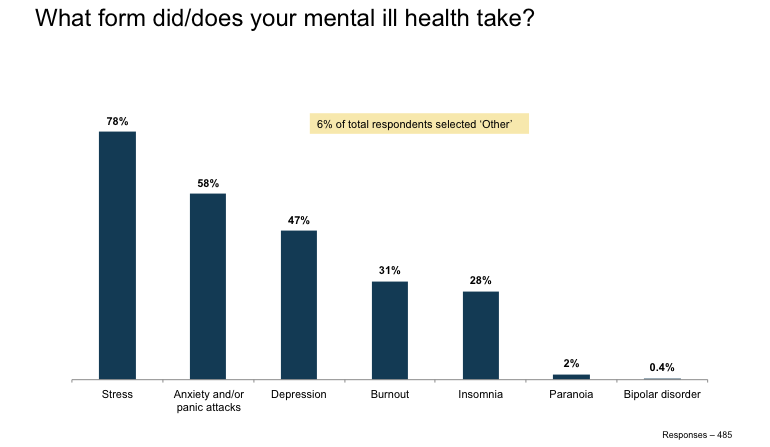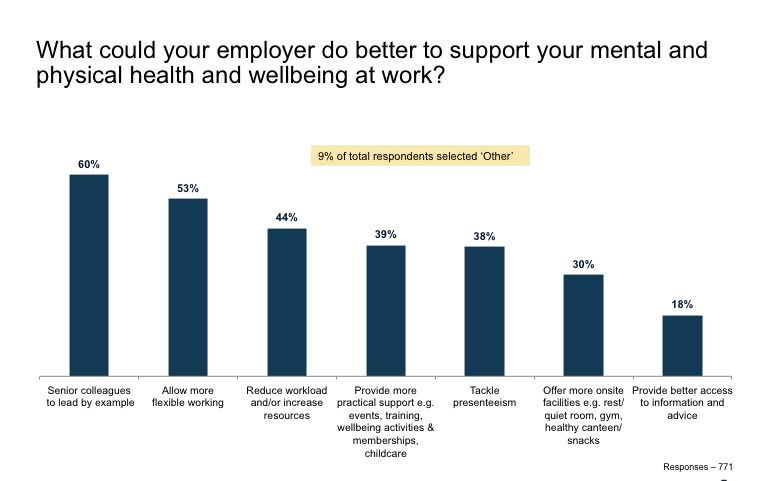
Work Hard, Stay Well
How ‘well’ do most City professionals feel, physically and mentally? And if people are experiencing issues that threaten their sense of wellbeing or ability to function effectively at work, what help is available? On the eve of World Mental Health Day, we share some wellbeing findings from our recent City-wide research and useful resources for members looking for information or support.
The state of health across the City
Physical health is viewed reasonably positively. 61% of our survey participants* rated their physical wellbeing as either ‘excellent’ or ‘good’, with another 33% describing it as ‘fair’.
Mental health is rated less positively. 55% said their mental health as ‘excellent’ or ‘good and another 39% as ‘fair’. In a concerning statistic, 60% commented that they had experienced some form of mental ill health in the past (diagnosed or not) or are experiencing it now.
Stress, anxiety and depression are the most common types of mental ill health. The chart below shows most the prevalent types of illhealth experienced.

The main factors affecting wellbeing in the City
Workload pressure is a major factor negatively impacting wellbeing. ‘Coping with workload pressure’ and ‘emotional and physical wellbeing’ are 2 of the top 4 challenges faced by City professionals (59% and 57% respectively). In the words of one professional “the pressure to achieve, based on extremely long working hours, is relentless”.
People fear the consequences of moving up the career ladder. 56% of respondents said they weren’t confident of being able to progress their career at their current employer without making unsustainable sacrifices in their personal/family life.
More autonomy over working hours and location is viewed as good for wellbeing. 73% of participants say that working flexibly has a positive impact on their personal health and wellbeing.
Support from employers
Employees acknowledge the effort being made by employers. 60% of respondents say their formal workplace policies are becoming more supportive generally. Others point to the range of practical assistance provided, from training on stress management and mental health awareness to helplines and formal sickness policies. But as one professional commented with irony: “there is plenty of support on offer, I just have very little time to take advantage of it”.
Material changes in the way people work are urgently needed. When asked ‘what more could your employer do to support your mental and physical wellbeing at work?’, people prioritised senior leaders role modelling a healthier way to work and other practical changes to resourcing and working practices - see chart below.

Office culture remains a major barrier to disclosing mental health issues. 66% of those affected currently or in the past by poor mental health said nothing to their employer or colleagues about this. The vast majority were worried about colleagues’ reactions and being judged and feared a negative impact on their career. Several described disclosure as ‘professional suicide’.
Wellbeing resources available to City professionals
Our Wellbeing section on the WorkLife Central website has a number of links for individuals concerned about their physical or mental health. These include links to independent help and advice lines, factsheets, advice on understanding and dealing with stress and practical support for employees in particular industries. Our Experience Bank offers a supportive online forum where members share experiences of taking and return from all types of extended leave.
We run a number of informative events on Wellbeing topics, led by independent experts. The topics cover mindfulness, resilience, ‘surviving and thriving’ in the City and more. We’re delighted that Sue Baker OBE, Director of ‘Time to Change, the mental health campaign, is talking to members during Mental Health Awareness Week in May about her own experiences of anxiety and depression and how Time to Change is helping to end mental health stigma and discrimination.
If you’re struggling with an issue in the workplace, poor work life balance or home matters are preventing you from focusing at work, then you might want to consider WorkLife Central Coaching - 1:1 support from an accredited professional coach at cost-effective prices. For less formal support, why not consider our cross-industry Mentoring scheme? Applications are currently welcome for our autumn 2017 scheme; the deadline is midnight this Friday 13th October and more information can be found here.
*****************************
* This survey of individuals working in ‘City’ professions was conducted from 19 June - 4 July 2017. It reflects the views of 1,022 respondents





 Originally Released On 07 October 2017
Originally Released On 07 October 2017